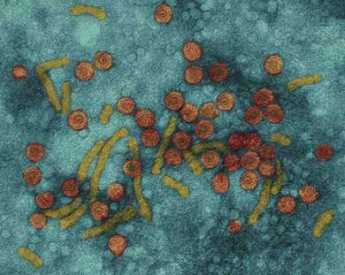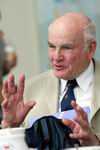Related Topics
Philadelphia Physicians
Philadelphia dominated the medical profession so long that it's hard to distinguish between local traditions and national ones. The distinctive feature is that in Philadelphia you must be a real doctor before you become a mere specialist.
Science
Science
Nobel Prizes
Some Philadelphians won Nobel Prizes for work done here, or elsewhere. Some prize winners would deny they are Philadelphians, but their work was nevertheless done here.
Baruch Blumberg, Renaissance Man

|
| College of Physicians |
Baruch Blumberg may be an octogenarian, but he radiates vigor and good health; his current intellectual interests are invariably on the cutting edge. He currently serves as the president of the American Philosophical Society, was for five years the Master of Balliol College at Oxford, was the Director of Astrobiology at NASA -- all of them after he had won the Nobel Prize in Medicine, and retired from his laboratory. He likes to run and bicycle, with a long history of disconcerting the populace of China, India, and Africa with early morning forays. His undergraduate major was physics, with graduate work in mathematics. He went to medical school at his father's suggestion.

|
| Hepatitis B |
The Nobel Prize was awarded for the discovery of the Hepatitis B virus, for which he developed a highly successful vaccine. It has been estimated that there are 375 million people in the world infected with this virus, and it leads in time to liver cancer, the most common form of cancer in Asia. If you set about to stamp out disease and save lives, it's advantageous to do it with an extremely prevalent disease. And then there are some surprising side-benefits. For some reason, women who are infected with Hepatitis B produce a disproportionately large number of male offspring, so that vast immunization programs in Asia are now starting to result in a larger proportion of females in the population. The lack of female children in Asian families has long been attributed to selective abortion, so it's satisfying to see an abatement of that particular slander.

|
| Baruch Blumberg |
Blumberg has twice been invited to deliver a lecture to the College of Physicians of Philadelphia. The first was a description of the problems of space travel. The second was a discussion of current trends in medical genetics. It seems that gene mutations only occasionally cause disease directly. The much more important genetic factor in disease affects the ability of some people to resist particular diseases and makes others more likely to be a victim. Hepatitis B? Well, that's so yesterday.
Originally published: Thursday, June 21, 2007; most-recently modified: Tuesday, May 14, 2019